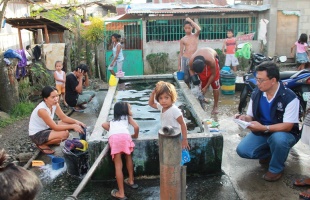
WHO/C.Claravall
About 7 million Filipinos in 2015 have resorted to open defecation–85% of which are from rural areas without toilet facilities. This poses a threat to the safety of food and quality of drinking water. In the last five years, the Philippines experienced a series of food- and waterborne disease outbreaks which could have been minimized if improvement in access to sanitation facilities had been given full attention.
“Until everyone has access to adequate sanitation facilities, the quality of water supply will be undermined and too many people will continue to die from waterborne and water-related diseases." according to Dr Maria Neira, Director of the WHO Department of Public Health, Environmental and Social Determinants for Health. Further, WHO reported in 2015 that access to adequate water, sanitation and hygiene is critical in the prevention and care of neglected tropical diseases (NTDs), which affect more than 1.5 billion people around the world, causing blindness, deformity, permanent disability and death. The practice of open defecation is also linked to a higher risk of chronic malnutrition which affects 161 million children worldwide, leaving them with serious physical and intellectual harm.
In the Western Pacific Region, WHO statistics shows that in 2014 about 94,000 deaths occurred due to diarrhoea caused by lack of safe water, sanitation and hygiene (WASH) services. Over 100 million people in the Region are affected by NTDs such as helminthiasis, schistosomiasis, trachoma, and lymphatic filariasis which are attributed to poor hygiene and sanitation problems.
“With the rapid population growth and the changing environment in developing countries, like the Philippines, sustainable and aggressive strategies departing from “business as usual” are necessary to make a significant difference in accelerating access to sanitation, particularly in rural areas ," emphasized by Mr Alexander von Hildebrand, Technical Officer, WHO in the Western Pacific Region during the opening ceremony of the Sanitation Learning Exchange (Sanlex) 2016 held in Quezon City.
WHO upholds the provision of safely-managed sanitation services as a human right and supports the Philippine Government in achieving universal access to sanitation as one of the targets of Sustainable Development Goals (SDGs). According to WHO, Sanlex 2016 can be a source of relevant information that policy makers at the national and local government levels can pick up to improve sanitation policy development, planning and implementation and achieve the SDG target on sanitation.
(WHO Press Statement at Sanlex 2016)
